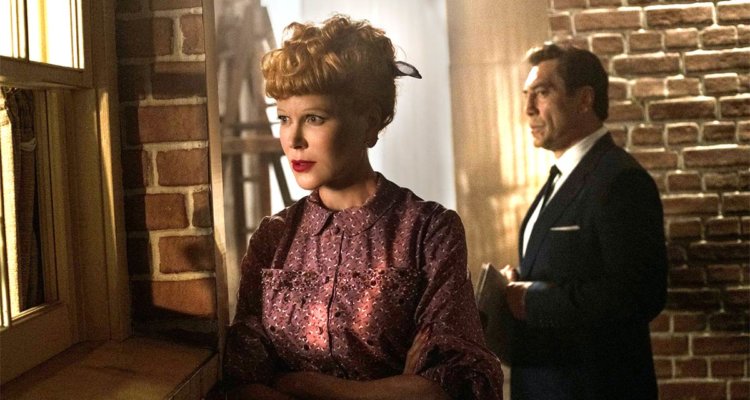“It was a scary goddamn week,” explains a trio of “I Love Lucy” showrunners in a fictional present-day documentary. Aaron Sorkin’s snappy, slick, crowd-pleasing biopic, “Being the Ricardos,” through unfailing comedic precision yet uneven dramatic tension, recounts those terrifying seven days during October 1953, when news broke of Lucille Ball being a member of the Communist Party. The news at hand threatened to upend the biggest show possibly in television history and occurs in the foreground of a failing marriage, on-set rivalries, and the creation of an episode.
READ MORE: ‘West Side Story’ Review: Steven Spielberg’s Musical Dazzles Despite A Key Casting Fumble
Lucy (Nicole Kidman) and Desi Arnaz (Javier Bardem), a tempestuous showbiz couple, are either tearing into each other or tearing each other’s clothes off. Right off the bat, despite her talent, and her total commitment to the role, it’s clear that Kidman doesn’t possess Ball’s expressive face. It’s a peculiar hindrance for an actress portraying a performer who garnered so many laughs with facial sight gags. Likewise, Bardem’s hulking appearance doesn’t cohere to Desi’s more petite stature. For much of “Being the Ricardos,” however, those visual incongruities matter very little. Because Kidman and Bardem are simply wonderful actors making incisive dramatic decisions. And there are boatloads of drama to be had.
On the same night Walter Winchell, a syndicated gossip columnist, announces on his radio show that Ball is a communist, the actress receives an early edition of “Confidential,” with a picture of Desi and another woman on the cover. The shockwaves from these revelations affect the couple throughout the week.
Though Lucy explains she became a Communist simply to please her grandfather, the network bosses and advertisers still breath down the couple’s necks. The writers room, where much of the sharp ping-pong dialogue bounds back and forth, might as well be a boiler room wherein the heat never subsides. The acidic, cantankerous William Frawley (J. K. Simmons), who played the couple’s next-door neighbor Fred Mertz, isn’t shy about speaking his mind. But in many ways, he is the kindest person on the show, and the gruff Simmons plays him to perfection. Frawley shares a contentious relationship with his on-screen wife Vivian Vance (Nina Arianda), but in private, Vance is grappling with body positivity issues in an industry that punishes women for aging and weight gain.
All the while multiple gears are turning within Lucy’s head—this movie, in fact, is a tribute to her as a creative perfectionist. Though she’s thinking about her marriage, the Communism accusation, and myriad other crises, she needles the director, the actors, the writers, and Desi for better, for more. Each action and reaction folds neatly into the other, a signal of Sorkin’s near-seamless writing, and of Kidman’s sharp, internal performance. Both are matched by Sorkin, notwithstanding his fixation for light emanating from random sources, and editor Alan Baumgarten capturing the uptempo rhythm and verve of television.
“Being the Ricardos” is also strongest when the churn of these personalities, especially show producer Jess Oppenheimer (Tony Hale) and television writer Madelyn Pugh (Alia Shawkat) come into orbit with Lucy and Desi. WIth them Sorkin adds more spinning plates: Not only is Lucy hoping to save her marriage by giving Desi a producing credit, but she’s also pregnant (an anathema subject for television). The film loses steam, however, when it becomes a narrative for how Desi can save the day rather than hewing closer to the perfectionism they both expect from the show.
Despite the snappy script, plenty of the components struggle to meet their aim. Sorkin employs de-aging technology on Desi for the flashbacks to his former clubbing days. The strategy reduces Bardem to ghoulish nightmare fuel. Beyond the uneven, at best, results, the application of de-aging is an odd choice for a director who’s lashed out at the Twitter backlash for his casting of Bardem and Kidman. If the intentionality of the casting stems from not wanting, as he says, “impersonations,” then why use de-aging to essentially create an impersonation?
The decision not only undercuts Bardem. It shows some tacit awareness that Bardem’s physical incongruity to Desi can’t be totally ignored. But for “Being the Ricardos” to work, you must ignore it. Because when you forget that Kidman and Bardem are playing Lucy and Desi, their committed performances do wash away the doubt, making this film a better portrait of red scare America than the two familiar television personalities.
But even by those standards, Sorkin manages to undercut the red scare America angle too. J. Edgar Hoover, one of the prime movers of McCarthyism, receives an odd applause line. The beat given to the cheer hits so briefly, you almost feel Sorkin’s weariness with portraying the moment but his inability to totally depart the off-kilter political dimension. And the film also features odd, cutting digs at comedic actress Judy Holliday.
“Being the Ricardos,” in many regards, mostly of Sorkin’s own doing, is a mixed bag. The one-liners zing. The performances by Kidman and Bardem are big showy affairs that still manage to get to the soul of their characters. And the crowd-pleasing elements of an underdog love story can’t be ignored. But every time the director comes close to fully casting his spell, he breaks it and reminds the viewer that despite Kidman and Bardem’s best efforts, they aren’t Lucy and Desi. “Being the Ricardos” isn’t a total disaster, but it’s not a grand triumph either. [C+]

